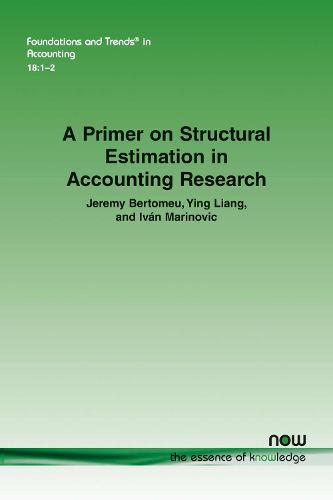Readings Newsletter
Become a Readings Member to make your shopping experience even easier.
Sign in or sign up for free!
You’re not far away from qualifying for FREE standard shipping within Australia
You’ve qualified for FREE standard shipping within Australia
The cart is loading…






This title is printed to order. This book may have been self-published. If so, we cannot guarantee the quality of the content. In the main most books will have gone through the editing process however some may not. We therefore suggest that you be aware of this before ordering this book. If in doubt check either the author or publisher’s details as we are unable to accept any returns unless they are faulty. Please contact us if you have any questions.
A Primer on Structural Estimation in Accounting Research provides an introduction to researchers interested in incorporating structural models into their analysis. The monograph is designed for researchers with little or no prior knowledge of structural models and with the objective to make barriers to entry into this literature no greater than in other theoretical or empirical areas. The emphasis is on adequate use of the methods in applied work. While most examples are drawn from accounting research, many of the methods are applicable more generally to other related areas such as finance, marketing, and economics.
This primer is divided into eight sections, which are interconnected but can be also read individually. Section 1 presents two simple guided examples of structural estimation exercises where the logic of the main tools can be absorbed with minimal formalism. Section 2 presents a step-by-step approach to structural estimation, generalizing the methods applied in the two examples. Section 3 discusses more details of the econometric methods for readers interested in applying statistical concepts and widely-used mathematical formulas for estimators and their standard-errors. Section 4 discusses special topics required in estimation approaches using dynamic models, including dynamic programming. Sections 5, 6 and 7 discusses contemporary advances in the context of principal-agent theory, disclosure theory, and earnings management, respectively. Section 8 concludes the monograph.
$9.00 standard shipping within Australia
FREE standard shipping within Australia for orders over $100.00
Express & International shipping calculated at checkout
This title is printed to order. This book may have been self-published. If so, we cannot guarantee the quality of the content. In the main most books will have gone through the editing process however some may not. We therefore suggest that you be aware of this before ordering this book. If in doubt check either the author or publisher’s details as we are unable to accept any returns unless they are faulty. Please contact us if you have any questions.
A Primer on Structural Estimation in Accounting Research provides an introduction to researchers interested in incorporating structural models into their analysis. The monograph is designed for researchers with little or no prior knowledge of structural models and with the objective to make barriers to entry into this literature no greater than in other theoretical or empirical areas. The emphasis is on adequate use of the methods in applied work. While most examples are drawn from accounting research, many of the methods are applicable more generally to other related areas such as finance, marketing, and economics.
This primer is divided into eight sections, which are interconnected but can be also read individually. Section 1 presents two simple guided examples of structural estimation exercises where the logic of the main tools can be absorbed with minimal formalism. Section 2 presents a step-by-step approach to structural estimation, generalizing the methods applied in the two examples. Section 3 discusses more details of the econometric methods for readers interested in applying statistical concepts and widely-used mathematical formulas for estimators and their standard-errors. Section 4 discusses special topics required in estimation approaches using dynamic models, including dynamic programming. Sections 5, 6 and 7 discusses contemporary advances in the context of principal-agent theory, disclosure theory, and earnings management, respectively. Section 8 concludes the monograph.